Jennifer Barclay's Blog, page 12
September 13, 2013
Mixing Travel and History: Two Books

Countless times I’ve wandered past the casino in Rhodes and the Turkish cemetery, without knowing Lawrence Durrell’s associations with what was once the British administrative headquarters after liberation of the island in 1945. Nor did I know that Rhodes new town was created when the Turks expelled the Greeks from the Palia Poli in 1309 – no wonder the locals prefer the new town.
RHODES: A NOTEBOOK is the latest in a series by Richard Clark, and is a real pleasure to dip into. Combining a travelogue on a sailing trip around Rhodes and nearby Symi with general essays on Greek history, language and culture, it provides rich insights into the well known and lesser known places of the island.
There’s a poignant note about the Valley of Butterflies, or Petaloudes, and he’s made me determined to get to Monolithos this winter. I think travellers en route to or from Tilos might find overnight stops in Rhodes less painful with this book in hand (or loaded onto the e-reader).

If you’ve read CRETE: A NOTEBOOK, then you’ll find some material is repeated here (understandably, as the book is aimed at different readers) but for someone like me with a mind like a sieve, it provided useful reminders. And I gleaned a lot from the notes on Greek culture. I loved this, which I hope he won’t mind my quoting here, showing that Greek rejection of authority applies even when riding a motorbike:
‘It is interesting that the main reason for not wearing crash helmets is not the heat or even a casual disregard for road safety… The real reason is that it is compulsory to wear one.’
Conclusion: well worth a read – and don’t miss the Crete book too. Clark lived in Crete and has travelled all over the island, and the book made me long to see some of the places he describes so lovingly.

When forced to leave Kosovo, the place she had fallen in love with, and return to England, Elizabeth Gowing became more than a little obsessed with the figure of Edith Durham, an Edwardian writer who had travelled in the region a hundred years earlier. Finding parallels with her own story in Edith's, Elizabeth found herself on the trail of this fascinating and brave character who needed only her tam o'shanter to shield her from the sun on treks through Albania's Accursed Mountains.
Elizabeth's journey to get to know her Edwardian counterpart is a journey through museum archives and letters, hunting for clues in libraries and catalogues, as much as through places ('Turn right at Mozart,' says a curator, and she wonders if this is how directions are given in heaven). It is woven with an extraordinary level of fine detail, like the embroidery on a pair of traditional Albanian slippers or a piece of silver filigree, craftmanship that she marvels at along the way.
The result is a quirky mix of biography, travel and history; it begins gleeful and humorous, and as she wanders the inner chambers of the gloriously bizarre Pitt Rivers Museum in Oxford, places where you might find an Inuit suit made of seal intestine, looking for a wolf’s tooth amulet, I read slowly, savouring every moment. As she gets deeper into the topic it starts to have a whiff of academic obsession, circling back on passages she remembered before, meandering through notes and asides on the workings of modern Kosovo, I wondered whether Elizabeth was lost forever in her obsession. Thankfully, she comes to the end of her search with an understanding of her own way forward.
Published on September 13, 2013 01:28
August 27, 2013
St Fanourios and the Gifts to Self
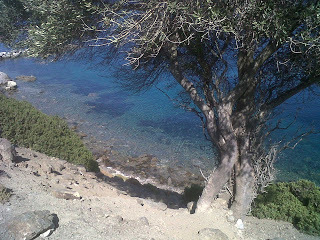
My book Falling in Honey is, in some ways, about losing things. It’s about losing people you know to cancer; about losing relationships you thought were your future.
But on the flipside, it’s about how these things encouraged me to grasp life by its curly goatish horns. The universe was waving a big banner that said: ‘What are you waiting for?’
To give myself new, happy plans for my future, I came up with the Gifts to Self.

One thing guaranteed to make me happy was a Greek island. The combination of sun, sea and stunning landscapes always hit the spot. I wanted a month on a Greek island.
Work also had to change, to stop dominating my life. I did the figures and decided I could live on a four-day week for a while.
The third gift was making sure I didn’t fall in love again for a good while, so my heart couldn’t be broken anytime soon.
It was all possible; I did it, and the sky didn’t fall.
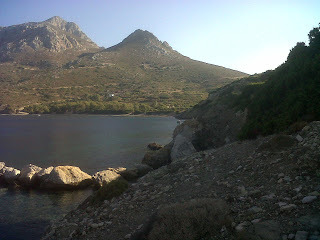
So I cooked up a plan: to move to Tilos.
It didn’t go smoothly.
But I now believed I had the power to make my life better. And two years later I came to live on a Greek island. I spend loads of time outdoors, walking with my dog and swimming in the sea.

This morning, around seven-thirty, from across the valley I heard the beautiful, soft, haunting sound of the priest’s voice singing a service. I checked my diary, which being a Greek diary handily lists the many saints’ days. Of course, the wondrous St Fanourios! Fanourios the Revealer, who helps you find what you’ve been looking for. It’s been a day for thanking him.

 Lisa the pup, unfortunately, didn’t find what she was looking for this morning: her boyfriend, who had been on Eristos beach all summer and had taken the big boat back to Athens last night, which meant it was safe to take her to the kantina again. She kept looking towards where he should be, willing him to appear. 'He loves me, I know he'll come any minute now, I can smell him...' The poor angel. We all tried to console her – how to tell her he would have stayed and waited forever if he could?
Lisa the pup, unfortunately, didn’t find what she was looking for this morning: her boyfriend, who had been on Eristos beach all summer and had taken the big boat back to Athens last night, which meant it was safe to take her to the kantina again. She kept looking towards where he should be, willing him to appear. 'He loves me, I know he'll come any minute now, I can smell him...' The poor angel. We all tried to console her – how to tell her he would have stayed and waited forever if he could?
But I've found two other things that I was looking for: a new house with my very own office (fingers crossed); and an energetic and social exercise class for the winter (still smiling from my very first zumba class tonight!).
My gifts to self could have been anything. What are yours - what are you looking for?
Here's the tiny church of St Fanourios in the old town of Rhodes, and nearby...

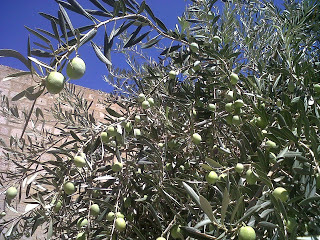


Published on August 27, 2013 13:12
August 20, 2013
A Romantic Dinner for Two

I don't think there's any better way to end the day than right here, at Elpida restaurant, in Ayios Andonis. We had left the car at Ayios Andonis and walked to Plaka in late afternoon, and since it was busy on the beach (busy! Plaka! it must be August...) we walked to the rocks at the far end, and lay there watching the snorkellers. Then we walked back and all I could think of was the food at Elpida. So we stopped in.
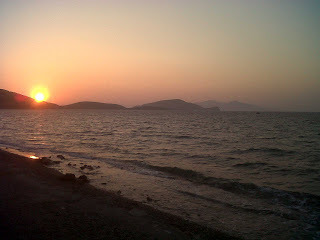
At the moment the sun started to go down, the other couples in the restaurant moved as one to the waterside edge of the restaurant to take photographs.


Food arrived just in time for me to take my first bite of fried calamari with tzatziki as the sun slid down behind the mountain... Nothing says 'Greek island' like this, eh?

I'd been thinking on the walk back, one of the things I love about Tilos is that it feels a little unfinished, like a continual work in progress; not packaged and prettified, but raw and elemental. And hardly anywhere in the world could you watch such a spectacular sunset from a place so beautifully informal, with a handwritten menu (where the words don't quite fit on the line...).

Surrounded only by beach and a couple of other houses, it's the most romantic spot for a dinner for two...

And nothing says love like giving your partner your last piece of calamari.
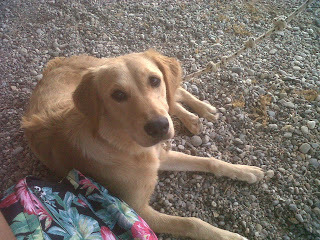
Thanks to Lisa the pup for a delightful evening!
Published on August 20, 2013 11:22
August 14, 2013
Heat, Heat and More Heat
It was appropriate - as well as being a little bit amazing - that Falling in Honey got a 5-star review in the Top 5 Books in Heat magazine this month. Because August in Tilos means heat (especially inside a kantina).
 But in case that wasn't enough in the way of a heat challenge, our eight-month-old resident comedy canine, Lisa, is also 'in heat'.
But in case that wasn't enough in the way of a heat challenge, our eight-month-old resident comedy canine, Lisa, is also 'in heat'.
 That's right, our little girl is growing up, and she's rather popular, especially with the young pup currently staying on Eristos beach right next door to the kantina. He leaps up when he sees our dusty-red car, and looks at me with sad, accusing eyes when he sees Lisa's not in it.
That's right, our little girl is growing up, and she's rather popular, especially with the young pup currently staying on Eristos beach right next door to the kantina. He leaps up when he sees our dusty-red car, and looks at me with sad, accusing eyes when he sees Lisa's not in it.
 Because I can't take her to Eristos, Lisa has become almost nocturnal, sleeping all the hot day, and waking up ready to play as soon as the sun starts going down. I think she's sneaking off to party at Mikro Horio all night while I'm asleep. So I've had to take her for her walks in the early evening, to beaches with few people and no dogs. Easy enough to find in Tilos anytime of the year - except August.
Because I can't take her to Eristos, Lisa has become almost nocturnal, sleeping all the hot day, and waking up ready to play as soon as the sun starts going down. I think she's sneaking off to party at Mikro Horio all night while I'm asleep. So I've had to take her for her walks in the early evening, to beaches with few people and no dogs. Easy enough to find in Tilos anytime of the year - except August.
'Why don't you take her to Lethra?' asked Stelios one day. And what a great call. I hadn't been for ages, and had forgotten what a stunningly beautiful half-hour walk it is; I can let Lisa off the lead as there are goat-gates to stop her getting onto the road, and the beach rarely has more than a few people on it.


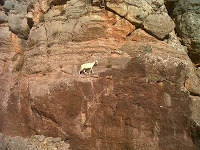
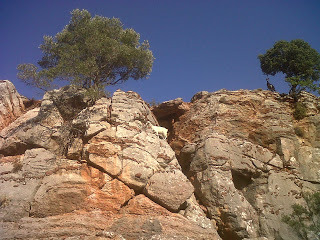


Another great walk is all the way around Livadia bay...
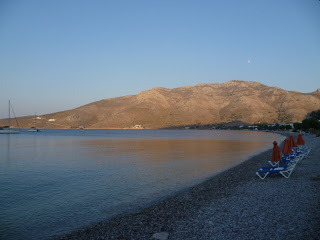
... to the little beach just before Faros for a swim as the sun goes down behind the hills opposite...

... or continuing around to the little harbour...

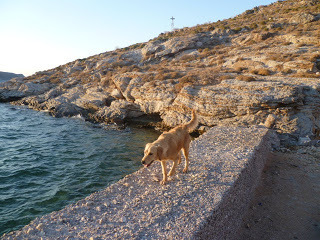

... and then up the hill to Stefanakis Villas, which get the last of the evening light. What a place to stay, with views across the bay at sunset! And totally peaceful, even in the height of summer...



If we haven't been tempted to stop for a drink somewhere in Livadia afterwards, we drive back across the island and catch the sun again before it goes down over Ayios Andonis...

Stefanakis Villas are the property of Stelios Stefanakis, who valiantly handles the comings and goings of ferries, ensuring we find a seat when we've forgotten to book ahead, and taking delivery of packages. For info on getting to Tilos, as well as the villas: http://tilos-travel.com/
 But in case that wasn't enough in the way of a heat challenge, our eight-month-old resident comedy canine, Lisa, is also 'in heat'.
But in case that wasn't enough in the way of a heat challenge, our eight-month-old resident comedy canine, Lisa, is also 'in heat'.  That's right, our little girl is growing up, and she's rather popular, especially with the young pup currently staying on Eristos beach right next door to the kantina. He leaps up when he sees our dusty-red car, and looks at me with sad, accusing eyes when he sees Lisa's not in it.
That's right, our little girl is growing up, and she's rather popular, especially with the young pup currently staying on Eristos beach right next door to the kantina. He leaps up when he sees our dusty-red car, and looks at me with sad, accusing eyes when he sees Lisa's not in it. Because I can't take her to Eristos, Lisa has become almost nocturnal, sleeping all the hot day, and waking up ready to play as soon as the sun starts going down. I think she's sneaking off to party at Mikro Horio all night while I'm asleep. So I've had to take her for her walks in the early evening, to beaches with few people and no dogs. Easy enough to find in Tilos anytime of the year - except August.
Because I can't take her to Eristos, Lisa has become almost nocturnal, sleeping all the hot day, and waking up ready to play as soon as the sun starts going down. I think she's sneaking off to party at Mikro Horio all night while I'm asleep. So I've had to take her for her walks in the early evening, to beaches with few people and no dogs. Easy enough to find in Tilos anytime of the year - except August.'Why don't you take her to Lethra?' asked Stelios one day. And what a great call. I hadn't been for ages, and had forgotten what a stunningly beautiful half-hour walk it is; I can let Lisa off the lead as there are goat-gates to stop her getting onto the road, and the beach rarely has more than a few people on it.






Another great walk is all the way around Livadia bay...

... to the little beach just before Faros for a swim as the sun goes down behind the hills opposite...

... or continuing around to the little harbour...



... and then up the hill to Stefanakis Villas, which get the last of the evening light. What a place to stay, with views across the bay at sunset! And totally peaceful, even in the height of summer...



If we haven't been tempted to stop for a drink somewhere in Livadia afterwards, we drive back across the island and catch the sun again before it goes down over Ayios Andonis...

Stefanakis Villas are the property of Stelios Stefanakis, who valiantly handles the comings and goings of ferries, ensuring we find a seat when we've forgotten to book ahead, and taking delivery of packages. For info on getting to Tilos, as well as the villas: http://tilos-travel.com/
Published on August 14, 2013 05:48
August 9, 2013
Kantina Eristos - Everything You Wanted to Know - Tilos, Greece
This week there’s been debate again about the legality of the free camping on Eristos beach, so it seems a good time to address Mark Hill’s questions about the kantina. Mark wrote:
"I want to know about this cantina! Seriously. I want to know everything about it. I want to know why you opened it. I want to know what it's made of. Where you bought it? I want to know what food you sell and where you get it and how much it costs and how you figured out how to cook it. I want to know who comes there to eat and when and why. Are they locals or tourists or a mix of both? That damned cantina fascinates the hell out of me!"

There’s been a kantina on Eristos beach every summer since around the year 2000. The first one, I think, was painted red and run by Stelios’s cousins. After that, it was Vangelis – otherwise known as Zorba – who ran the kantina, with his daughter Martina. I remember Vangelis telling me about it when I first met him, how he used to like meeting the people who visited the island. I think I only visited the kantina once when Martina ran it, during my first summer on Tilos in 2011; Vangelis was by then working with his son Nikos at his new restaurant in Livadia. I remember my first visit to the kantina well, as it wasn’t long after the first koupa dance in the village where I’d briefly first met Stelios; he was playing cards there with Apostolis when I strolled up in my bikini to order a toasted sandwich. A week or so later, I met Stelios again at the second koupa, and by September we were together.

When her father died in early 2012, Martina decided to sell the kantina, and she offered it to Stelios. Stelios spent his summers growing up on Eristos beach, partied there through his twenties when he invariably came back to the island for the summer, and he knows all the people who come to camp at Eristos every year. What he bought from Martina was the physical trailer along with all its fixtures and fittings – a fridge, a water tank, a tostiera etc. But there’s also much more expense and paperwork involved than you’d expect. You have to apply to the municipality for the grant to use the piece of land on the beach (which they could have granted to another applicant, but he was at an advantage as the municipality must favour permanent residents of the island who need work). He had to have a licence to sell food, and insurance (I’m not allowed to work there, but I run errands and of course get to hang out there and help clear the stones off the beach at the start of the summer...). He needed a tax number and cash register and accountant – all very expensive in Greece. But none of that would put Stelios off. He’d wanted to run that kantina for years.

There are also restrictions on the kind of food that can be sold. It’s a kantina, not a restaurant, so nothing can be served on a plate with cutlery – it has to be in sandwich form. There are three nearby tavernas, and he can’t offer food similar to theirs. So the kantina offers cheap fast food, drinks and ice creams. But the hamburgers are freshly made from good quality meat. Most people order ‘tost’ – a cheese and ham toasted sandwich with tomato – with a Greek coffee or a frappe in the mornings, maybe an omelette sandwich, and take away cold bottles of water or ice with them, and gradually as the day goes on people order burgers and village sausages and tuna salad sarnies with beer or wine.
Food is supplied by Antonis, who’s also deputy mayor and one of the stars of the Tilos football team. When you live on an island with only one boat a day during the summer, you need a reliable supplier. Cousin Popi also regularly gets roped in to picking up odd supplies from Rhodes – her luggage for the weekend suspiciously heavy with backgammon boards, extra pairs of shorts and plastic bags for making ice.
The kantina doesn’t serve traditional food, you wouldn’t want to eat it all the time – but importantly it’s cheap (sandwiches 2–3 euros, drinks under 2 euros), it’s quick and easy; there’s service with a smile, and a friendly, hippy sort of vibe.

The customers include locals –Marios and Apostolis and Antonis and Angelos – who come for the company, and people who are staying elsewhere at Eristos, or like American/New Zealanders Bob and Joanie have arrived on their yacht, or have come up on the bus from Livadia for the day. We currently have a couple of successful French authors who are doing a bit of work from the kantina during the days, brushing shoulders with Greek guys with tattoos and girls with dreadlocks. It’s a fantastic mix of nationalities, families and couples and groups of friends.
Most of the customers are from the free camping, though; the hundreds of people who set up their tents and canopies under the trees along the beach through July and August. Free camping is actually illegal in Greece, but Tilos, like a dozen other islands, allows it to happen. As our mayor, Maria Kamma-Aliferis, wrote in a Greek newspaper this week, the campers on Eristos have been coming for years (some twenty years or so) and contribute to the island, and they respect the place and clean up after themselves, and they’ve become friends of the island. They mostly bring business to the local shops and restaurants. But every year, the existence of the free camping is contended by one of the nearby hotels. So it’s a precarious thing.
Last week, two lovely English guys came to camp at Eristos, and bought my book along with the drinks and sandwiches from the kantina. They went up to the festival at Harkadio Cave on the Saturday night to watch the traditional dancing and they bought souvlakis from the stand we were running. And they said they'd only decided to come to Tilos because they read an article I'd written for Wanderlust about the camping on Eristos last year.http://www.wanderlust.co.uk/magazine/blogs/my-life-as-an-expat/tales-from-the-kantina-eristos-beach-tilos-greece?page=all


Stelios loves running the kantina. It’s his life for a few months, and we don’t really have a conversation that doesn’t revolve around the kantina – pick up some oranges, pay the bakery, wash the hammock, bring some new music… And for many people, making new friends or meeting up with old
ones at the kantina really makes their summer holiday complete.

(Did you know... Kantina has its own Facebook page, 'Kantina Eristos Tilos' - feel free to join!)
"I want to know about this cantina! Seriously. I want to know everything about it. I want to know why you opened it. I want to know what it's made of. Where you bought it? I want to know what food you sell and where you get it and how much it costs and how you figured out how to cook it. I want to know who comes there to eat and when and why. Are they locals or tourists or a mix of both? That damned cantina fascinates the hell out of me!"

There’s been a kantina on Eristos beach every summer since around the year 2000. The first one, I think, was painted red and run by Stelios’s cousins. After that, it was Vangelis – otherwise known as Zorba – who ran the kantina, with his daughter Martina. I remember Vangelis telling me about it when I first met him, how he used to like meeting the people who visited the island. I think I only visited the kantina once when Martina ran it, during my first summer on Tilos in 2011; Vangelis was by then working with his son Nikos at his new restaurant in Livadia. I remember my first visit to the kantina well, as it wasn’t long after the first koupa dance in the village where I’d briefly first met Stelios; he was playing cards there with Apostolis when I strolled up in my bikini to order a toasted sandwich. A week or so later, I met Stelios again at the second koupa, and by September we were together.

When her father died in early 2012, Martina decided to sell the kantina, and she offered it to Stelios. Stelios spent his summers growing up on Eristos beach, partied there through his twenties when he invariably came back to the island for the summer, and he knows all the people who come to camp at Eristos every year. What he bought from Martina was the physical trailer along with all its fixtures and fittings – a fridge, a water tank, a tostiera etc. But there’s also much more expense and paperwork involved than you’d expect. You have to apply to the municipality for the grant to use the piece of land on the beach (which they could have granted to another applicant, but he was at an advantage as the municipality must favour permanent residents of the island who need work). He had to have a licence to sell food, and insurance (I’m not allowed to work there, but I run errands and of course get to hang out there and help clear the stones off the beach at the start of the summer...). He needed a tax number and cash register and accountant – all very expensive in Greece. But none of that would put Stelios off. He’d wanted to run that kantina for years.

There are also restrictions on the kind of food that can be sold. It’s a kantina, not a restaurant, so nothing can be served on a plate with cutlery – it has to be in sandwich form. There are three nearby tavernas, and he can’t offer food similar to theirs. So the kantina offers cheap fast food, drinks and ice creams. But the hamburgers are freshly made from good quality meat. Most people order ‘tost’ – a cheese and ham toasted sandwich with tomato – with a Greek coffee or a frappe in the mornings, maybe an omelette sandwich, and take away cold bottles of water or ice with them, and gradually as the day goes on people order burgers and village sausages and tuna salad sarnies with beer or wine.
Food is supplied by Antonis, who’s also deputy mayor and one of the stars of the Tilos football team. When you live on an island with only one boat a day during the summer, you need a reliable supplier. Cousin Popi also regularly gets roped in to picking up odd supplies from Rhodes – her luggage for the weekend suspiciously heavy with backgammon boards, extra pairs of shorts and plastic bags for making ice.
The kantina doesn’t serve traditional food, you wouldn’t want to eat it all the time – but importantly it’s cheap (sandwiches 2–3 euros, drinks under 2 euros), it’s quick and easy; there’s service with a smile, and a friendly, hippy sort of vibe.

The customers include locals –Marios and Apostolis and Antonis and Angelos – who come for the company, and people who are staying elsewhere at Eristos, or like American/New Zealanders Bob and Joanie have arrived on their yacht, or have come up on the bus from Livadia for the day. We currently have a couple of successful French authors who are doing a bit of work from the kantina during the days, brushing shoulders with Greek guys with tattoos and girls with dreadlocks. It’s a fantastic mix of nationalities, families and couples and groups of friends.
Most of the customers are from the free camping, though; the hundreds of people who set up their tents and canopies under the trees along the beach through July and August. Free camping is actually illegal in Greece, but Tilos, like a dozen other islands, allows it to happen. As our mayor, Maria Kamma-Aliferis, wrote in a Greek newspaper this week, the campers on Eristos have been coming for years (some twenty years or so) and contribute to the island, and they respect the place and clean up after themselves, and they’ve become friends of the island. They mostly bring business to the local shops and restaurants. But every year, the existence of the free camping is contended by one of the nearby hotels. So it’s a precarious thing.
Last week, two lovely English guys came to camp at Eristos, and bought my book along with the drinks and sandwiches from the kantina. They went up to the festival at Harkadio Cave on the Saturday night to watch the traditional dancing and they bought souvlakis from the stand we were running. And they said they'd only decided to come to Tilos because they read an article I'd written for Wanderlust about the camping on Eristos last year.http://www.wanderlust.co.uk/magazine/blogs/my-life-as-an-expat/tales-from-the-kantina-eristos-beach-tilos-greece?page=all


Stelios loves running the kantina. It’s his life for a few months, and we don’t really have a conversation that doesn’t revolve around the kantina – pick up some oranges, pay the bakery, wash the hammock, bring some new music… And for many people, making new friends or meeting up with old
ones at the kantina really makes their summer holiday complete.

(Did you know... Kantina has its own Facebook page, 'Kantina Eristos Tilos' - feel free to join!)
Published on August 09, 2013 06:29
July 20, 2013
Tales from the Kantina - July at Eristos beach, Tilos
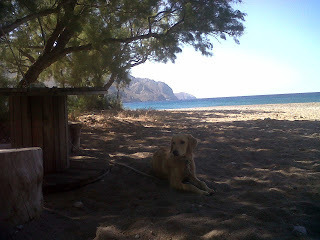
For those who think Eristos beach is for hippies, meet Nikos: a clean-cut, middle-aged mechanical engineer (now an out of work mechanical engineer, but that’s Greece in 2013). This is his second time in Tilos, and he comes for the tranquillity (Lisa, stop barking), the nature, somewhere peaceful to read a book. He learned English during three years of post-graduate studies in Ottawa; he says it’s rusty, but by the time we’ve discussed Nobel Prize-winning poet Odysseas Elytis, the Antikythera Mechanism, Plato’s dialogue on etymology, theories on the Fifth Element… I’d beg to differ.
He’s been reading my book, and mentions that they now believe the Santorini volcano erupted earlier than previously thought; he says he likes the quotations at the beginning, and has translated the following lines from Elytis’ great work ‘To Axion Esti’ which he’s written down for me:
Then He spokeAnd the sea was bornAnd in its midst he sowed small worlds…Horses of stone with manes erectAnd serene amphoraeAnd curved backs of dolphins…
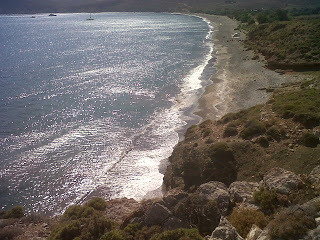
Somehow, I’m not sure how, we get onto talking about the Antikythera Mechanism, an ancient Greek device like an analog computer built in 100 BC. It combined the Egyptian solar and Greek lunar calendars to forecast the stars in the sky for many years, thus being an invaluable aid to navigation. It was only the size of a book, and although its wooden exterior had rotted away when it was discovered by sponge divers a hundred years ago, its intricate metal parts were still intact. They don’t make computers like they used to, eh?
Until recently, no-one knew what the strange object was – until advance X-ray analysis was done in Britain. Nikos draws me diagrams to show how the various cogs and wheels measured the orbits of the planets. They already knew the sun was the centre of our solar system, something we were taught was discovered in the 16th century. Nikos says the Ancient Greeks had also built the steam engine in Alexandria around that time, but it was destroyed when the Romans invaded.
‘Imagine,’ he says. ‘Three hundred years after the steam engine was re-discovered in England, there was the industrial revolution. If an industrial revolution had happened back then… Man could have conquered space in 300 AD.’ This launches us into a discussion on the merits and demerits of so-called progress.
But I shall leave you with a joke, which Nikos told me to add to my Greek jokes collection:What’s the most efficient way to stop a Greek from talking?Tie his hands behind his back.

We've had some beautiful times at the kantina recently - evenings with cool breezes, cold wine, warm company. Friends from Austria and Sweden are back, camping on the beach or staying in the nearby Nitsa Apartments or Eristos Beach Hotel. And there are new friends from Athens. Andreas, who has brought along some good music to play. Christina, who spent hours playing with Lisa.
Kostas owned a wine shop in Athens for seven years and has just had to close it as the restaurants and bars he supplied were no longer able to pay their bills; he's now out of work. Stavroula has work as a junior school teacher, but she's finding it harder to explain to some of the children why the school has to provide lunch for them. The couple will camp on Eristos with a budget of 15 euros a day for as much of the summer as they can. Psychologically, says Stavroula, it's good just to feel the ground beneath your feet every day. The area of Athens where they live - Exarchia, where I used to go for nights out when I lived there - is losing its spirit these days. She hands a posy of thyme she's gathered to Christina.

The other Kostas and Koula left last night on the big ship back to Athens, so unfortunately we'll have no more of Koula's amazing desserts. We'll miss seeing Kosta going out snorkelling every day, and Koula creating beautiful things out of tin cans. But she's painted this fabulous sign for the new shop at the entrance to Megalo Horio, for a women's co-operative selling local products, opening soon:
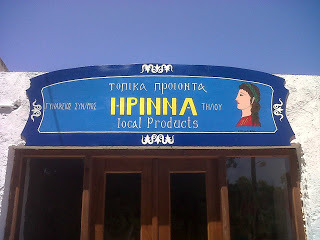
***
The latest on FALLING IN HONEY - please share it around if you can! Fab coverage in the Mail on Sunday's You magazine:
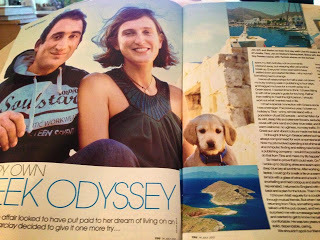
http://www.dailymail.co.uk/home/you/article-2360153/My-Greek-Odyssey-One-womans-rat-race-escape.html
Interview on Female First:
http://www.femalefirst.co.uk/books/falling-in-honey-299152.html
And a wonderful new cover for the US edition:
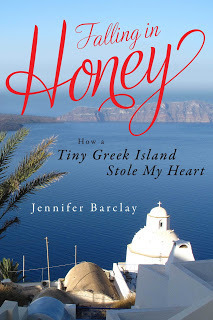
Published on July 20, 2013 00:33
July 13, 2013
The Chicken and Egg Problem

There’s been debate here for a little while about why our chickens haven’t produced any eggs yet. I was researching online to see if there are things missing from the kotetsi, the coop. I wondered if they might be sick, as they’ve been losing feathers, especially one of them – but as Stelios advised, it is July and pretty hot. Then there was the other possibility…

Finally I bit the bullet and asked Grigori, who has a farm close by, if he wouldn’t mind, erm, coming to have a look at them when he has time. He stopped off while driving by and strode across the field.He scanned the six of them quickly. ‘Jennifer, you’ve got five cockerels.’

That would be why we haven’t seen any eggs yet. It would also explain why they've been fighting. I went home and told Stelios his suspicions had been right. Apparently, when chickens are small it’s hard to tell if they’re male or female, and since ours are different breeds, they’re different sizes anyway.‘But why’s the one hen not laid any eggs?’ asked Stelios.‘Well, she’s probably quite tired…’ I guessed.So, the only question next is – to borrow an old Young Ones line – who’s for the pot?
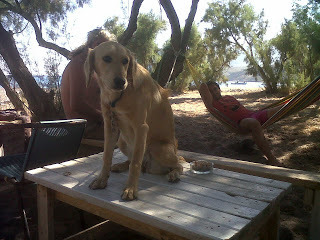
The Kantina is of course up and running and Lisa the Labrador cross is loving all the attention. When she’s not meeting new people, she’s doing important work digging holes.

And just when I thought a Tilos summer couldn’t get any better, having people coming up to me to say they’ve read my book and/or blog makes it super-special. A bit like one of Stelios’s hamburgers. So - thanks to everyone who's come up and said hello. You're the best.

Published on July 13, 2013 09:53
July 9, 2013
Tales from the Tilos Kantina - 'Dromografos'
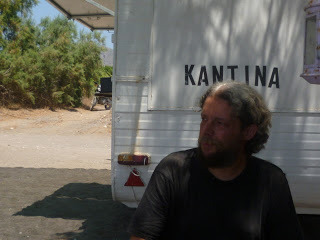
One evening in early June, Stefanos was in his tent on Eristos beach in Tilos as usual, where he’s come to camp every summer for the last ten years from his home in Athens. But on that evening, he wasn’t just enjoying the peace and quiet, the sound of the sea, the stars above. From his little tent, he was involved in a group effort to keep the signal of the Greek national television station alive.
The softly-spoken 43-year-old tells me over coffee that he was working last year as a computer and website programmer, but the work dried up as a result of the economic crisis. ‘I was politically active before but I felt I had to do something more. When I didn’t have a job anymore, I had the urge to do something about it.’ So he started taking photographs, recording what he saw happening on the streets, and posting them online. He calls himself Dromografos, a play on words meaning something like street reporter.
'It’s an ugly situation in Athens, worse every day, thousands without work. People are tired - so much has happened, it leaves them in a state of shock, they're being hit from every direction.
'The protests have achieved something but the state is fighting back with such force… Four thousand municipal police have been transferred to the main police department, giving them the power to have guns. It’s like a police state in Athens, the police being used like an army, similar to a junta. The constitution means nothing; the government has passed over 20 laws without going through parliament, saying it’s a “unique situation” so they only need the president’s approval – parliament is just decorative.'
One of those laws, says Stefanos, was the shutting down of public television. The Greek government claimed ERT, the state channel, was a ‘haven of waste’, and to save money they were going to shut it down.
'And sure, it was wasteful. But TV is the most powerful weapon. Public television is the only medium that’s unbiased. The government announced at 6pm they were shutting it down at midnight.'
Stefanos, along with other journalists protesting about what this meant for the country, tried to maintain the signal of the TV station online.
'For young people it was very important. The signal never went down on the internet.'
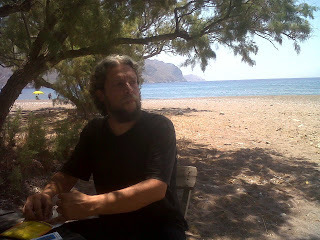
The journalists who have banded together during this time call themselves Media from the People (in Greek, Media Apo To Kato). Their main target is to form a news agency that’s not controlled by anyone, and to set up a website by the autumn that will be the most reliable source for learning what’s happening in Greece; European news media have expressed interest in using it, and they have the technology for web TV. The team of around a dozen groups of people includes some currently employed by mainstream press, working anonymously through social media.
‘What happened with ERT was actually a chance to promote what we are doing. We were interviewed three times on television. Whatever happens with ERT in the future, whether they do put it back on air in a different form, it’s a good thing that all these TV and newspaper guys came together to build something new.’
If they manage to make it happen, he says, people won’t have to search twenty or thirty sites to find out what’s really happening. As Stefanos sees the current Greek government acting more like a junta, it’s important for people to have access to real information, unfiltered by the controls of the privately owned media, in the lead-up to new elections.
What does he see in the future for Greece?
‘There are two possibilities. The first is continuing the current route with the IMF, Troika and so on. Most economists, even the capitalist ones, think this is leading to destruction, that there’s no way Greece can develop in a way it can pay back the loans. The new loans just pay the interest on the previous loans.
‘Then there's the other scenario. The main opposition party, Syriza, if they managed to make a government, would have to agree to co-operate with the communist party, which wouldn’t be easy but it could happen. They would try to re-negotiate with the EU so Greece could not pay the interest on the loans for 20 years until we can grow the economy. It would put money back into the market. If the EU didn’t agree to this and Greece left the EU, it could trigger an exodus from other countries in similar positions – Ireland, Spain, Portugal.
‘The next years in Greece will be hard – but most people think there is nothing to lose, that the situation can’t get any worse. At the beginning of this crisis, Papandreou said "we will do our best so that every family has one working person…" We thought at the time it was a mistake – how could there only be one person in a family working?! But now it’s come true. People who’ve lost their jobs receive welfare from the state for six months only, then they have to go back to their villages to live off a parent’s pension to survive. Properties are left empty, shops close, streets are deserted.’
As for Stefanos, although he sells his photos whenever he can to foreign media (usually when something major makes international news), he offers them for free within Greece – ‘for the cause’ – as long as others don’t use them for profit. And he’s found his new way of life incredibly rewarding, even though he’s surviving on a minimal income.
‘There was something missing before. So many people were struggling and there was no-one to cover it, to say what they wanted; no-one knew the people who lost their jobs were demonstrating and asking for something. I’ve learned many things I didn’t expect. I’m on the streets from morning til night, and try to post photos immediately.
‘There’s stress, but I feel great about it – when I get up I think wow, what do I have to do today, and when I go back at eleven or twelve at night I feel very tired but very happy, it fulfils me.’
In the meantime, he's monitoring the news from Eristos Beach, Tilos.

Find Stefanos at www.dromografos.org, @dromografos
Published on July 09, 2013 11:48
June 13, 2013
Three Days in Pserimos: A Different Experience

Pserimos, one of the smallest inhabited islands in Greece, has an absolutely perfect white-sand beach shelving gradually into a shallow, sparkling blue bay.
Unfortunately, surrounded by Kos, Kalymnos and the shores of Turkey, it’s inevitably become a stop on the day cruise itinerary. An hour after I arrived, the tour boats had come in and the tiny harbour was crowded with pinkish daytrippers wading into the sea or strewn across the cafes. Old folks beckoned me over to buy packets of herbs, and waterside stalls shimmered with things made out of shells. If I’d arrived on one of those boats and seen the island for only that hour, I wouldn’t have fallen in love with Pserimos.
I’d arrived on the regular ferry, however, as a guest of Georgos Karaiskos, who’d taken me under his wing and invited me to pitch my tent under the tall pine trees of the scout camp he runs. I'd found his email address while hunting for information on getting to the island. We’d exchanged a few emails and I explained I lived on another Dodecanese island, Tilos. He’d replied:
‘Nice place, BUT wait until you see and stay for some days at Pserimos. Different experience!!... You will like it, and come every year.’
I hoped he was right; for now I needed a quiet swim, and followed signs to Vathi past a huge olive grove. Reaching the top of the hill, I was crestfallen to see the villa developments of Bodrum in Turkey across the water, a couple of fish farms closer to shore, and the beach full of debris washed in by the sea. A naked couple were clearly enjoying themselves, though, unperturbed by the wasps buzzing around a water-hole for goats. In spite of a rather unusual invitation to join them, I had a quick swim and left them to it.
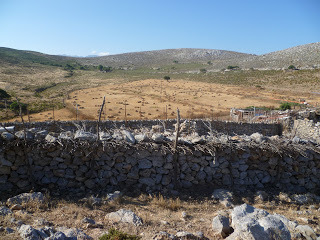
I still felt Georgos’s claim was a bit of a stretch, but as I followed another path to Marathonta to see some more of the island, it grew on me. The gentle hills, the goats with huge twisted horns and clinking bells, gorse with yellow flowers, sage and thyme bushes; farm enclosures with dry stone walls reinforced with wood and recycled furniture (to keep the goats out); a farmer snoozing with his dog in the shade of a tree; gardens of fig trees and prickly pear, grape vines and flowers.
I decided to stay for a few days and get to know the place a little. And I’m so glad I did.
I got back to the village, strolled to the harbour, and now I had that soft white sand and clear, cool, blue water all to myself.
Georgos had recommended I eat at Sevasti Pikou’s taverna next to the church for good food and good prices – and it also drew in a local crowd – so that’s where I headed, tempting as it was to linger with my feet in the sand. The ‘fylla’, or vine leaves stuffed with rice, meat and tomato, were probably the best I’ve ever eaten, and there was home-made garlicky tzatziki and delicious slices of a huge fish called rinacaught that day – the fisherman showed us the photo on his phone – sprinkled with the local herb throumbi and served with fried potatoes. Georgos joined me for a while and told me about his plans to build cabins at the scout camp for people to come and stay.

The smell of the pine trees around my tent was magnificent. I slept well, woke up with the roaming chickens and the crows. At eight a.m., the whole beach to myself again, I swam across the empty bay, then had coffee and yoghurt and honey on the beach at Themis’ cafe, watching the fishing boats coming in with octopus and sponges and fish. Pserimos at its best seemed hard to beat.
A couple of older ladies bobbed about in the water in their dresses and headscarves. Local men occasionally zipped about on little scooters, one with a goat in the trailer. There aren’t really any roads on Pserimos, just a few sandy paths and dirt tracks, but someone drives an army truck with a ram’s skull and horns on the fender.
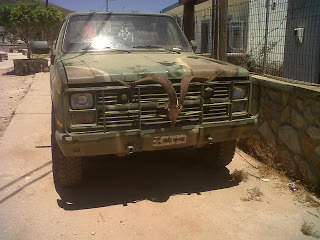
Some thirty years ago, the population of the island was over three hundred; now only twenty or so live on Pserimos all year round, mostly old folks. But as summer starts and school finishes, it’s a wonderful place for kids and young people to come back to. The whole island is only a few kilometres long by a few kilometres wide, and great for walking.
To avoid the morning tour boats, I set out to walk to Grafiotissa beach, filling my bottle with water. The island has fresh water and it tastes delicious; from the beach I’d seen a young man drawing water from a well for his grandmother. The path was a little tricky to find at first, past goat pens, but then I was striding across hillsides full of purple-flowering thyme, with deep blue seas below. And within half an hour I got a glimpse of a spectacular sight. A long strip of white sand, rust-red cliffs, and half a small whitewashed chapel perched on top, the other half having fallen into the sea many years ago.

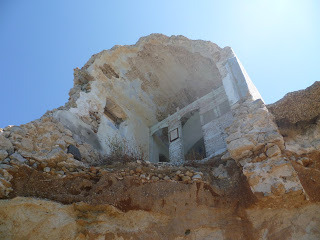
I passed happy hours alone at Grafiotissa. The view from the sand was of the quieter ends of Kos and Kalymnos, the deserted islet of Plati, and the occasional yacht floating by in the distance. In the courtyard of the newer church nearby were fragments of ancient carved stones, and five sheepskins hung to dry on a fence.
On the third day, after a breakfast of fresh bread with local thyme honey, I walked to Krevatia beach. ‘Tha berdepseis poli,’ said an older man in Manola’s café (where the day before I'd feasted on squid grilled on the barbecue), when I asked about which path to take: ‘You’ll get very confused.’ He was right, but I wasn’t in a rush and this walk was perhaps the most beautiful yet. There was another lonely church surrounded by grazing goats, trees blown horizontal by the winds, baled hay. A green swathe of hillside dropped gradually down to a nice stretch of sand and pebbles, again deserted with clear, tranquil sea.

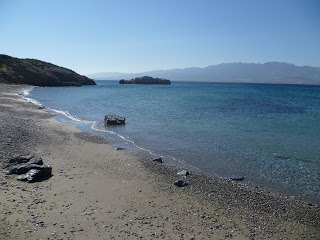
Later, eating roasted aubergines and courgettes, I thought of the things I now knew and loved about Pserimos, having spent a few days here. The birds nesting in the bell-tower of the church next to Sevasti’s taverna, and the food from Sevasti’s kitchen. The communal grove of eight thousand olive trees and the sound of the wind blowing through it; the smell of sage and thyme; the evening noises of the birds, and the bells of sheep and goats grazing. The people who stayed for only an hour or two missed so much. It was hard to wrench myself away in the end, and I swam as many times as I could across the sparkling, clear bay, taking in the pretty houses and hillsides.

The irony was that to get back to Tilos I had to connect to a boat in Kos, which meant leaving on one of the tour boats. But in the end, the crew dancing cheesily to Zorba on deck with a few game passengers was pretty good fun, I had to admit. Maybe they weren’t so bad after all.
Getting there
The Maniai boat (I’m intrigued that Pserimos has a boat named after the ancient demons of mad frenzy) leaves from opposite the Olympic Hotel in Kalymnos harbour at 9.30 a.m. and returns at 5 p.m. (daily from May to October; three times a week out of season). Tour boats leave Kos harbour around 9.30 a.m. in summer, stopping at different times in Pserimos, and leave by around 3.30 p.m.
Where to stay
Pikou Sevasti has rooms above the taverna (pserimos@gmail.com, (0030) 22430 29337), as do most of the cafes, and there’s Kalliston Studios at the corner of the beach (petkoukouva@yahoo.gr, (0030) 698 0389 276). Pikou Sevasti also sells ice and bread, and free showers are available to customers arriving by private yacht.
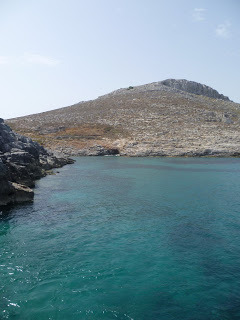
Published on June 13, 2013 12:08
June 1, 2013
Rhodes: My Latest Favourite Things

As someone who lives on a small island, every now and then I have to take the ferry to a bigger island, Rhodes, to get some chores done. The list of things I need (or want) gets longer and longer until I have to wrench myself away from the beach and get on the boat. But because there's so much you can't get in Tilos, it’s a great excuse to shop – it’s like Christmas with more sunshine and less stress.
And so this week I dash down to the port with a giant suitcase. The quayside is crowded with people and inevitably friends ask, ‘Are you leaving?’ I grin and lift up the suitcase – empty. I’m going to run around Rhodes, filling it up, even though the only thing I really need is one piece of paper, a certified copy of my passport from the British Vice Consulate.
As always, I’m going to have a wonderful few days running around town, chatting to people in shops. People in Rhodes are really friendly. Before I lived in Tilos, when I was just passing through Rhodes to get to Tilos on holiday, I had no time for the bustling town, but now I appreciate it more and more. My friend Anna tells me that she sees me moving there one day, but I’m not sure I’d have as much fun if I lived there.
When people ask me where I’m from, telling them I’m English but live in Tilos is the conversation-starter. One day I glance in the window of a sports shop next to the hotel, and end up in conversation with the owner who tells me his father, who was from Kalymnos, was sent to teach in Tilos at the school, which was then in Mikro Horio (the now-abandoned village), during the Italian occupation before World War II. Apparently the Italians gradually learned to send the smart people to the little islands where they couldn’t cause as much trouble, so his father found himself in Lipsi and Tilos.
*


I’m in Mandraki, the area of Rhodes where the small boats like the Tilos Sea Star come in. Walking up the hill from the domed New Market (Nea Agora) and bus station with the Old Town on my left, I spot a new gift shop. It’s immediately clear that this isn’t your average tourist shop, but real arts and crafts. I’m a sucker for beautiful things and am drawn inside, where I get talking to Haritomeni.
She confirms she just opened the shop, To Doron (meaning ‘The Gift’), in late April. Her parents live in Rhodes but until recently she lived in Athens. I infer that this is another ‘Crisis Story’ – it’s nearly impossible for young people to make any kind of living in the capital at the moment, so she’s come to Rhodes and set up this business. And it deserves to do well, as the shop is filled with tasteful, original hand-made work from artists all over Greece, especially Crete.
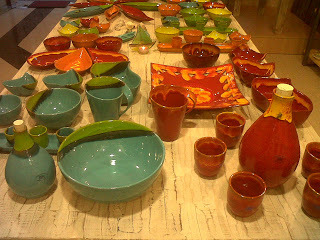
What’s more, they’re Crisis prices: very reasonable. There are little boats and shells and starfish made of bronze and aluminium for between 5 and 15 euros. Museum-quality reproductions of ancient Greek art in lovely presentation boxes from 12 euros. And ceramic bowls just perfect for some yoghurt or olives or tzatziki from 8 euros. There are plenty of pieces that are tiny enough that they won’t make your luggage overweight, either. It’s a great place to buy authentic gifts and souvenirs in Mandraki – and to support Greek artists rather than buying the made-in-China rubbish too often found in the Old Town.
Haritomeni (I like the name – it means ‘lovely, graceful, blessed’) tells me she had a wonderful holiday in Tilos a few years ago. She stayed by the sea in Livadia but went all over the island visiting the monastery, Eristos, Megalo Horio. ‘It’s a disgrace that the museum isn’t known all over Greece, all over the world,’ she says, referring to the bones of the dwarf elephants, the last elephants in Europe. ‘I was embarrassed I didn’t know about it!’
After leaving the shop, I continue up the hill to Avgoustinos where I sit in the lively open-air restaurant and have a massive, tasty gyros pita, big salad and a beer (for 9 euros).
*
OK, not many people have a story about buying printer ink cartridges. But I do.
I like to buy from Cartridge World, partly because it’s an easy way to recycle the cartridges, but also because they’re so much cheaper. But when I call to check what time they close, I find out the shop’s moved a little further out of town – too far for me to walk. When I ask about buses, the man on the other end of the phone asks where I am, and I say Mandraki. ‘No, where exactly?’ Er, the Hermes Hotel. ‘OK, I’ll be there in ten minutes.’
A charming (OK, say it, good-looking) young man in black comes to collect the cartridges, and brings me what I need later in the day. If that ain’t service, I don’t know what is.

*
The young woman who helps me find good underwear in Intimissimi has a cool haircut, so I ask her where she has it done, as I need a trim. (I’ve still not found someone who cuts hair in a way I like – would the next person to visit please bring me a Toni and Guy hairdresser?). Before I leave my favourite underwear shop, she asks if there’s a branch of Intimissimi in Tilos. I grin, imagining scantily clad mannequins in the square in Livadia. ‘I’m guessing you’ve never been to Tilos?’ But actually she has, several years ago; all she remembers of Livadia is that the place was deserted until noon. I tell her we actually do have a really good clothes shop ( To Sokaki - see the Tilos Life page on this blog), but no international chains, thank goodness.
The man I talk to in the health food shop, where I buy maca root and find a town-centre source for wine from the village of Embona, says someone in his family has a house in Tilos but they find the people unwelcoming; even after living there for two years, they've never been invited to anyone’s house. I explain that it’s certainly not that people are unwelcoming or unfriendly. It’s just that people keep themselves to themselves more on a small island, I think, as you need to keep some kind of privacy.
I go to the hairdresser for a trim and we spend the first half hour of the appointment talking about what I do, and e-books and copyright, and how I can perhaps help out another client of his who has written something. It’s more of a social visit than a haircut.
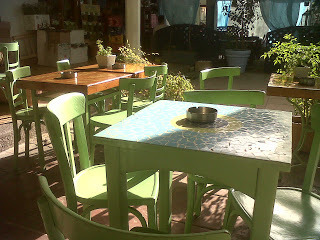
For dinner, I try the Symi Kafeneion in the New Market, near Indigo (and the deli or pantopoleio where I sometimes buy cheddar or prosecco). It’s been there for sixty years – the beautiful, raven-haired woman who runs it informs me that it was first her grandfather’s, then her father's – but has recently been spruced up with a lick of paint and a meze menu. I order an Alfa beer and a delicious plate of roasted vegetables drenched in garlic vinaigrette, mopped up with half a loaf of moist, springy bread. Yum.
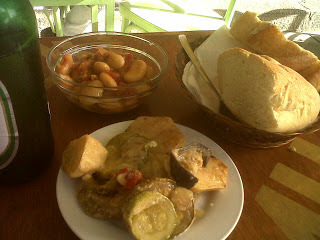
*
On Thursday morning, I go for a swim before breakfast. It’s of course nothing like as nice as swimming in lovely Tilos, but I like the fact that locals go for their regular morning swim in Rhodes, especially the older folks who tend to chat to one another in the water – it’s that social thing again.

Mid-morning, having bought a tent, a kettle and some seeds and seedlings, I discover a street market just outside the Old Town on the south side, near the Gate of St John. It’s a slightly smaller version of the Wednesday and Saturday market that takes place near the cemetery. Restraining myself from buying too much, I choose olives and peppers and small local peaches, just in season. I buy a carnation plant and a jasmine plant for a few euros each (I am turning into my mother). I am smiling and receive a marriage proposal and an elopement proposal.

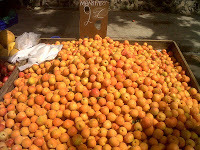
I get back to the hotel, and in the afternoon I go out again to pick up my new set of glasses, and I think I’ll go back to indulge in something nice from the gift shop. But I realise I’ve hit the retail wall. I’m all shopped out. There is no shopping left in me. I have lost the will to shop.
But I’ve got the certified copy of my passport, done my blood tests, bought my brown rice and ticked off a long list of needs and wants, and I’ll be back in a few weeks. And maybe one day when I win the lottery (OK, I don’t play the lottery, but my equivalent – when they make the movie of Falling in Honey) I’ll have a little pied-a-terre in Rhodes. Ah, but then I wouldn't get to chat to lovely Nikos in the Hermes Hotel...
*
To Doron is at 23 Alexandrou Papagou street (tel. 22410 20144)
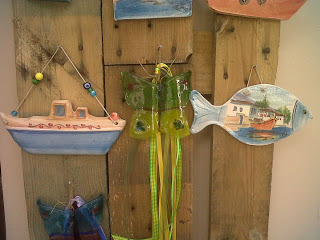
Published on June 01, 2013 22:36



